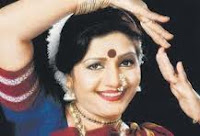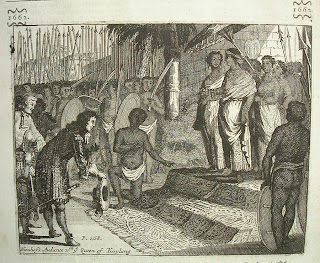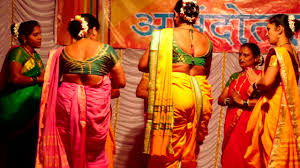Boom Boom Mattukkarans: Curse Myths tale
Last January, my post on "Boom Boom Mattukarans-Gangireddu" received good viewers all through the world going through and is placed as one of the popular posts.
“Boom Boom Mattukaran or Gangireddu” as they are popularly known in South India, especially in the states of Telangana, Andhra Pradesh, and Tamil Nadu. Boom Boom Mattukaran or Gangireddu- “the bull’s play” is a very popular form of dance. Quite common to watch in rural areas and of course in nowadays in urban areas like Hyderabad (question of survival) it is a common site in every village. This is perhaps one of the very few rural entertainments that have survived through times.
A bull, that is decorated with multicoloured cloths and ornaments moves from one house to the other led by its master who plays the 'Nadaswaram' or the “Sahanayi” during Pongal-Sankranti festival to Dusshera festival for a period of 6-8 months in a year. Bulls are trained to dance or perform acrobatics to entertain the crowd. The training is given by the 'Yadava' sect they acquire bulls and train them. The Boom Boom Mattukaran or Gangireddu earn money, clothes, and grains in return for the performance.
The feats of the bull are indeed pleasing. The Boom Boom Mattukaran or Gangireddu can dance rhythmically, nod in acceptance, reject in negation, kneel down and prostrate, bow down and even stretch its tongue to show it can sing and moos too to prove its caliber. It can put its four legs on a plate or exhibit more enterprising feats such as standing on its master's chest and bowing down in reverence when he sings in praise of a donor.
They are also known as Perumal Mattukkarar in Tamil are nomadic who move from one place to another along with bull. They put up temporary settlements for some brief period and proceed further in due course.
Well, while discussing the same with my father, I encountered that there is a folktale story behind called "Curse Myths" for them to be called as Boom Boom Mattukarar or Perumal Mattukkarar. The word Boom Boom refers to the sound made by the drum or is called the Urumi instrument. In Andhra Pradesh, they use the long pipe instrument and play music. I have seldom come across any gangireddu with a Urumi drum. This drum makes a peculiar sound that is used as a fashion in the latest Tamil Television Channel's popular soaps in identification with negative role players. Perumal Mattukaran refers to the person/s who takes care of Perumal-Lord Vishnu or Narayana's Bull.
I get to see a multicoloured decorated bull along with its master playing the shahanayi-musical instruments passing by from one house to another from Dusshra to Sankranti festivals in Hyderabad.
These bulls are trained to dance and perform acrobatics or gymnastics like nodding heads as a sign of acceptance, approval, and agreement and moving sideways as to deny, decline or refuse to negate. They also kneel down and prostrate, stretching out tongue to show that they can sing, and speak as to entertain the crowd.
In South Tamil Nadu, there was a practice by the rural people to denote their bulls and cows for the Perumal temple. These bulls and cows are further tamed by these nomadic groups.
It is said that these nomadic were flower gatherers and garland makers for the lord Vishnu. They sold flowers for their livelihood. Perhaps they were called by a different name then. If anybody knows it please post the same in your comment...
How did they end up with nomadic life with a bull relates to "Curse Myths Tale". Here in Hyderabad, while interviewing one such Gangireddus, I encountered that their ancestors had a direct vision or darshan of Lord Venkateshwara of Tirupati and he blessed them with a bull, and musical instruments. So, they carry out the tradition of going around with the bull even today.
The
origin of Gangiredu is mentioned in Siva Purana. (Siva Puranam compilation in English
by D.S.R. Anjaneyulu and Published by Executive Officer Tirumala Tirupati
Devasthanams, Tirupati. 2013)
According to Siva
Purana-the story goes that, once when Siva
and Parvati were contentedly enjoying their conjugal bliss, the whole world
likewise was happily going about its tasks with dutiful dedication. Sacrificial
rites and other holy acts were being performed with due regularity and
sincerity. However, in the meantime, the demon, Gajasura, was born in the clan
of Tarakasura. He prayed to Brahma and received several boons from the deity.
His capital, Sonitapura was flourishing with plenty and prosperity. And like
his predecessor, he too began pestering the ranks of gods and the sages. Indra
was determined to put an end to Gajasura and his success. As sage Narada came
to his court, singing the glory of Gajasura’s realm, Indra was further
strengthened in his determination to punish Gajasura.
Narada also went to Sonitapura, and receiving the
honours of Gajasura, told the demon: “O demon-king, don’t you realize that by
praying to Lord Siva, you can bring Him to your side and make yourself
invincible? Lord Siva is indeed partial to His devotee, and your prayers will
be satisfactorily answered by Him.” Accordingly, Gajasura performed severe
penance, with Lord
Siva in mind, and found the favour of that god. He
actually succeeded in imprisoning Lord Siva in his heart.
When Lord Siva disappeared from Silver Mountain,
its denizens, including Parvati and Skanda, were much perturbed. Skanda sent
the Rudra hordes in search of Siva. After a long search they succeeded in
finding out that Siva was incarcerated in Gajasura’s heart. Hearing the news
from the messengers, Parvati prayed to Lord Vishnu for his help. He assured her
that he would bring back Lord Siva to her.
Accompanied by Brahma, Vishnu went down to
Sonitapura, in the guise of a mendicant-entertainer who goes about with a caparisoned
bull “Gangireddu”, doing amusing tricks. As the disguised divine duo and
their fancy bull were roaming the streets of Sonitapura, Gajasura sent his men
to fetch them into his presence.
When the false entertainers arrived at the palace
gate, Gajasura asked them to display their tricks with the bull. Brahma and
Vishnu sang the hymns in praise of Siva, and the bull was dancing to their tune.
Hearing the song and dance, the Siva embedded in Gajasura’s heart rose up and
started inflicting pain in his throat.
Realizing the success of their mission, Brahma and
Vishnu were delighted, as they saw the discomfiture of Gajasura, who addressed
Lord Siva thus: “Lord, why art Thou squeezing my neck? Is it fair that Thou shouldst
be so captivated by the entertainer’s praises of Thee pining for Parvati Devi’s
company? If Thou really want to return to Kailasa, take me along with Thee, for
I cannot live even a second outside of Thy presence before me or within me. Is
it not to achieve perfect communion with Thee that I hid Thee in my heart?”
Siva replied: “O demon-king, I appreciate your
sincere devotion. But my place is on Mount Kailasa and beside my consort Parvati.
Anyway, your end is fast approaching, and I have to hurry back to my duty of
taking care of the re-creation of the living world which is annihilated in me.
So make your final request and I will honour it.”
Gajasura replied: “I will not come in the way of the
process of re-creation, not will I separate Thee from Parvati. Kindly grant me communion
with Thy supreme spirit.” Lord Siva granted that Gajasura could live by his
side in the form of a holy rat. Gajasura felt supremely gratified and began chanting
the sacred Mantra, “ Namah Sivaaya”. Siva came out of him, tearing his belly.
Gajasura died as a demon, was reborn as a holy rat, and followed Siva wherever
the deity went.
Mount Kailasa and its residents greeted the return
of Lord Siva with extreme satisfaction and jubilation.
Curse Myths Tale:
It is said that originally the boom boom mattukkarans or Perumal mattukkakarans were agriculturists and engaged in flower cropping. In order to test them one day the Lord disguised himself like an old man (I don't know whether it is Vishnu or Venkateshwara or Rama or Krishna) and approached one family for food. The head of the family refused and sent him away. Lord reappeared again and this time, the head of the family said that he would not offer food by sharing with him his crop after the harvest. But he questioned the old man if would he like to share the upper portion or the lower one. For this, the old man said, he would share the upper portion and went away. In order to escape the sharing, the head of the family played a game and cultivated peanuts or groundnuts. As the old man appeared again during the harvest period, he was given the upper leaves as his share.
Again, the head of the family said that he was going with the second crop and this time what he would prefer- for this the old man said he would go with the lower portion. Again, the head of the family played the trick by cultivating paddy and took away the paddy grain giving the old man the husk and grass.
The story further says that the Lord revealed his original form after being cheated twice and cursed them they become nomads and wander from one place to another for food. Lord also told them they would never be able to cultivate the lands. If at all they did, they would not get yield. He also ordered them to tame the bulls and cattle of the temple.
This curse myth's tale is the reason for their nomadic life but how long they would be in this state is not known. I think they missed questioning Lord who appeared before them about the "Time Factor-How long, Till what period, centuries, and so on".......












Comments
Boom barrier dealers in Hyderabad - Automatic sliding gate and motor